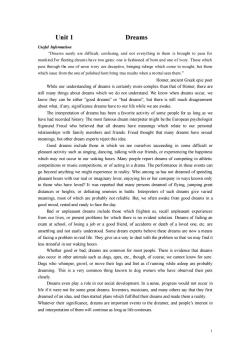《新编大学英语》综合教程(第三版第二册)B2U5_Self-market_Reading Material_B2U5 课文背景材料

Unit 1 Dreams Useful Information "Dreams surely are difficult,confusing,and not everything in them is brought to pass for mankind.For fleeting dreams have two gates:one is fashioned of hom and one of ivory.Those which pass through the one of sawn ivory are deceptive,bringing tidings which come to nought,but those which issue from the one of polished hom bring true results when a mortal sees them." Homer,ancient Greek epic poet While our understanding of dreams is certainly more complex than that of Homer,there are still many things about dreams which we do not understand.We know when dreams occur,we know they can be either“good dreams'”or“bad dreams'”,but there is still much disagreement about what,if any,significance dreams have to our life while we are awake. The interpretation of dreams has been a favorite activity of some people for as long as we have had recorded history.The most famous dream interpreter might be the European psychologist Sigmund Freud who believed that all dreams have meanings which relate to our personal relationships with family members and friends.Freud thought that many dreams have sexual meanings,but other dream experts reject this idea. Good dreams include those in which we see ourselves succeeding in some difficult or pleasant activity such as singing,dancing,talking with our friends,or experiencing the happiness which may not occur in our waking hours.Many people report dreams of competing in athletic competitions or music competitions,or of acting in a drama.The performance in these events can go beyond anything we might experience in reality.Who among us has not dreamed of spending pleasant hours with our real or imaginary lover,enjoying his or her company in ways known only to those who have loved?It was reported that many persons dreamed of flying jumping great distances or heights,or defeating enemies in battle.Interpreters of such dreams give varied meanings,most of which are probably not reliable.But,we often awake from good dreams in a good mood,rested and ready to face the day. Bad or unpleasant dreams include those which frighten us,recall unpleasant experiences from our lives,or present problems for which there is no evident solution.Dreams of failing an exam at school,of losing a job or a good friend,of accidents or death of a loved one,etc.are unsettling and not easily understood.Some dream experts believe these dreams are now a means of facing a problem in real life.They give us a way to deal with the problem so that we may find it less stressful in our waking hours. Whether good or bad,dreams are common for most people.There is evidence that dreams also occur in other animals such as dogs,apes,etc.,though,of course,we cannot know for sure. Dogs who whimper,growl,or move their legs and feet as if running while asleep are probably dreaming.This is a very common thing known to dog owners who have observed their pets closely. Dreams even play a role in our social development.In a sense,progress would not occur in life if it were not for some great dreams.Inventors,musicians,and many others say that they first dreamed of an idea,and then started plans which fulfilled their dreams and made them a reality. Whatever their significance,dreams are important events to the dreamer,and people's interest in and interpretation of them will continue as long as life continues. 1
1 Unit 1 Dreams Useful Information “Dreams surely are difficult, confusing, and not everything in them is brought to pass for mankind.For fleeting dreams have two gates: one is fashioned of horn and one of ivory. Those which pass through the one of sawn ivory are deceptive, bringing tidings which come to nought, but those which issue from the one of polished horn bring true results when a mortal sees them.” Homer, ancient Greek epic poet While our understanding of dreams is certainly more complex than that of Homer, there are still many things about dreams which we do not understand. We know when dreams occur, we know they can be either “good dreams” or “bad dreams”, but there is still much disagreement about what, if any, significance dreams have to our life while we are awake. The interpretation of dreams has been a favorite activity of some people for as long as we have had recorded history. The most famous dream interpreter might be the European psychologist Sigmund Freud who believed that all dreams have meanings which relate to our personal relationships with family members and friends. Freud thought that many dreams have sexual meanings, but other dream experts reject this idea. Good dreams include those in which we see ourselves succeeding in some difficult or pleasant activity such as singing, dancing, talking with our friends, or experiencing the happiness which may not occur in our waking hours. Many people report dreams of competing in athletic competitions or music competitions, or of acting in a drama. The performance in these events can go beyond anything we might experience in reality. Who among us has not dreamed of spending pleasant hours with our real or imaginary lover, enjoying his or her company in ways known only to those who have loved? It was reported that many persons dreamed of flying, jumping great distances or heights, or defeating enemies in battle. Interpreters of such dreams give varied meanings, most of which are probably not reliable. But, we often awake from good dreams in a good mood, rested and ready to face the day. Bad or unpleasant dreams include those which frighten us, recall unpleasant experiences from our lives, or present problems for which there is no evident solution. Dreams of failing an exam at school, of losing a job or a good friend, of accidents or death of a loved one, etc. are unsettling and not easily understood. Some dream experts believe these dreams are now a means of facing a problem in real life. They give us a way to deal with the problem so that we may find it less stressful in our waking hours. Whether good or bad, dreams are common for most people. There is evidence that dreams also occur in other animals such as dogs, apes, etc., though, of course, we cannot know for sure. Dogs who whimper, growl, or move their legs and feet as if running while asleep are probably dreaming. This is a very common thing known to dog owners who have observed their pets closely. Dreams even play a role in our social development. In a sense, progress would not occur in life if it were not for some great dreams. Inventors, musicians, and many others say that they first dreamed of an idea, and then started plans which fulfilled their dreams and made them a reality. Whatever their significance, dreams are important events to the dreamer, and people’s interest in and interpretation of them will continue as long as life continues

Information about Sigmund Freud and Carl Jung Sigmund Freud (1856-1939):An Austrian neurologist who developed a new system for understanding the way that people's minds work,and a new way of treating mental illness called psychoanalysis.He believed that the bad experiences that people have as children can affect their mental health as adults,and that by talking to mentally ill people about their past life and feelings, the hidden causes of their illness can be found.He wrote The Interpretation of Dreams and The Ego and the Id.His ideas,especially about the importance of sex,had a very great influence on the way that people thought in the 20th century. Carl Gustav Jung(1875-1961):A Swiss psychiatrist who studied the importance of dreams and religion as problems of the mind,and divided people into two groups,introverts and extroverts. Jung developed the idea of the collective unconscious,the belief that people's feelings and reactions are often based on deep memories of human experience in the past.He worked with Sigmund Freud until they had a serious disagreement. 2
2 Information about Sigmund Freud and Carl Jung Sigmund Freud (1856-1939): An Austrian neurologist who developed a new system for understanding the way that people’s minds work, and a new way of treating mental illness called psychoanalysis. He believed that the bad experiences that people have as children can affect their mental health as adults, and that by talking to mentally ill people about their past life and feelings, the hidden causes of their illness can be found. He wrote The Interpretation of Dreams and The Ego and the Id. His ideas, especially about the importance of sex, had a very great influence on the way that people thought in the 20th century. Carl Gustav Jung (1875-1961): A Swiss psychiatrist who studied the importance of dreams and religion as problems of the mind, and divided people into two groups, introverts and extroverts. Jung developed the idea of the collective unconscious, the belief that people’s feelings and reactions are often based on deep memories of human experience in the past. He worked with Sigmund Freud until they had a serious disagreement
按次数下载不扣除下载券;
注册用户24小时内重复下载只扣除一次;
顺序:VIP每日次数-->可用次数-->下载券;
- 《新编大学英语》综合教程(第三版第二册)B2U4_Self-market_Reading Material_B2U4课文背景材料.doc
- 《新编大学英语》综合教程(第三版第二册)B2U4_Self-market_Reading Material_B2U4 课文翻译及课后练习答案.doc
- 《新编大学英语》综合教程(第三版第二册)B2U3_Self-market_Reading Material_B2U3课文背景材料.doc
- 《新编大学英语》综合教程(第三版第二册)B2U3_Self-market_Reading Material_B2U3课文翻译及课后练习答案.doc
- 《新编大学英语》综合教程(第三版第二册)B2U2_Self-market_Reading Material_B2U2课文翻译及课后练习答案.doc
- 《新编大学英语》综合教程(第三版第二册)B2U2_Self-market_Reading Material_B2U2 课文背景材料.docx
- 《新编大学英语》综合教程(第三版第二册)B2U6_Self-market_B2U6 Grammar and Vocabulary.doc
- 《新编大学英语》综合教程(第三版第二册)B2U5_Self-market_B2U5 Grammar and Vocabulary.doc
- 《新编大学英语》综合教程(第三版第二册)B2U4_Self-market_B2U4 Grammar and Vocabulary.doc
- 《新编大学英语》综合教程(第三版第二册)B2U3_Self-market_B2U3 Grammar and Vocabulary.doc
- 《新编大学英语》综合教程(第三版第二册)B2U2_Self-market_B2U2 Oral Quiz_06 B2U02 QUIZ.docx
- 《新编大学英语》综合教程(第三版第二册)B2U2_Self-market_B2U2 Oral Quiz.ppt
- 《新编大学英语》综合教程(第三版第二册)B2U2_Self-market_B2U2 Grammar and Vocabulary.doc
- 《新编大学英语》综合教程(第三版第二册)B2U6_Self-market_B2U06 QUIZ_B2U6 Oral Quiz.ppt
- 《新编大学英语》综合教程(第三版第二册)B2U5_Self-market_B2U05 QUIZ_B2U5 Oral Quiz.ppt
- 《新编大学英语》综合教程(第三版第二册)B2U3_Self-market_B2U03 QUIZ_B2U3 Oral Quiz.ppt
- 《新编大学英语》综合教程(第三版第二册)B2U3_Self-market_B2U03 QUIZ_06 B2U3 Quiz.doc
- 《新编大学英语》综合教程(第三版第二册)B2U4_Self-market_06 B2U04 QUIZ_B2U4 Oral Quiz.ppt
- 《新编大学英语》综合教程(第三版第二册)B2U6_料理鼠王transcript.docx
- 《新编大学英语》综合教程(第三版第二册)B2U6_Self-market_Writing Material_推展段落方法之——比较与对比法.docx
- 《新编大学英语》综合教程(第三版第二册)B2U5_Self-market_Reading Material_B2U5课文翻译及课后练习答案.doc
- 《新编大学英语》综合教程(第三版第二册)B2U6_Self-market_Reading Material_B2U6课文翻译及课后练习答案.doc
- 《新编大学英语》综合教程(第三版第二册)B2U6_Self-market_Reading Material_B2U6课文背景材料.doc
- 《新编大学英语》综合教程(第三版第三册)B3 U7 Self-market_B3 U7 QUIZ_B3U7 Oral Quiz.ppt
- 《新编大学英语》综合教程(第三版第三册)B3 U7 Self-market_B3U7 Grammar and Vocabulary.doc
- 《新编大学英语》综合教程(第三版第三册)B3 U7 Self-market_Reading Material_B3U7 课文翻译及课后练习答案.doc
- 《新编大学英语》综合教程(第三版第三册)B3 U7 Self-market_Reading Material_B3U7 课文背景材料.docx
- 《新编大学英语》综合教程(第三版第三册)B3U1_01 B3 U1 menu.ppt
- 《新编大学英语》综合教程(第三版第三册)B3U1_02 B3 U1 Activate.ppt
- 《新编大学英语》综合教程(第三版第三册)B3U1_03 B3 U1Read by critical thinking.ppt
- 《新编大学英语》综合教程(第三版第三册)B3U1_04 B3 U1 Translation & Writing.ppt
- 《新编大学英语》综合教程(第三版第三册)B3U1_Self-market_Listening Material_tape script.doc
- 《新编大学英语》综合教程(第三版第三册)B3U1_Self-market_Reading Material_Judging one's personality.doc
- 《新编大学英语》综合教程(第三版第三册)B3U1_Self-market_Reading Material_personality decides appearance.doc
- 《新编大学英语》综合教程(第三版第三册)B3U1_Self-market_Reading Material_You cannot buy happiness.doc
- 《新编大学英语》综合教程(第三版第三册)B3U1_Self-market_Writing Material_增强语句表现力的方法.docx
- 《新编大学英语》综合教程(第三版第三册)B3U1_傲慢与偏见经典雨中对白.doc
- 《新编大学英语》综合教程(第三版第三册)B3U3_01B3 U3 Menu.ppt
- 《新编大学英语》综合教程(第三版第三册)B3U3_02 B3 U3 Activate.ppt
- 《新编大学英语》综合教程(第三版第三册)B3U3_03 B3 U3 Read by critical thinking.ppt
